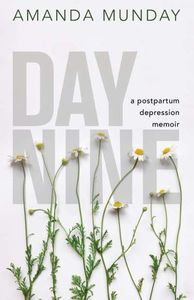Read an Excerpt from Amanda Munday's Silence-Breaking Day Nine: A Postpatrum Depression Memoir
While awareness and understanding of postpatrum depression has been increasing in recent years, there is still a disturbing lack of support and solutions available to those who experience it.
Amanda Munday's powerful, raw memoir Day Nine: A Postpatrum Depression Memoir (Dundurn Press) is part of the growing conversation that hopes to change that.
The title refers to the timing of Munday's admittance to a Toronto psychiatric ward - nine days after her daughter was born. With startling honesty and vulnerability, Munday details her journey in unvarnished terms (including eighteen days in the ward). Few social identities come with more expectation and baggage than motherhood, and Day Nine is a stigma-busting, beautifully written record of what is so often suffered in silence.
We're extremely proud to present an excerpt from this important book, courtesy of Dundurn Press.
CW: mental illness
Excerpt from Day Nine: A Postpatrum Depression Memoir by Amanda Munday:
June 21, 2014
Sent: June 21, 2014, 8:51 a.m. From: Jackie To: Amanda
Let me know when you guys are off cloud nine and can pull yourself away from staring at Fiona in total admiration while cooing “oooh look what we made!” (I totally get that’s a place you’re probably at)
Whenever you’re ready we should Facetime! I want to see her and hear your labour stories and catch up on how your first few days are going.
lotsa lotsa lotsa love. And no rush either!
Sent: June 21, 2014, 9:14 a.m. From: Amanda To: Jackie
Your CanLit News
Subscribe to Open Book’s newsletter to get local book events, literary content, writing tips, and more in your inbox
Not on cloud mine can’t stop crying haven’t slept more than four hours since Tuesday am feeling beyond crazy and desperate for help. Gordon is helping and in charge of coordinating visitors and calls right now.
I sob as I read my friend’s kind email. I’m proud of my comprehension and absorption of full sentences. Maybe I’m not crazy after all? Gordon’s mother is coming to visit today. I’m anxious about her seeing me in this state, but I also see the longing in Gordon’s eyes for the normalcy of his family. I know he’s looking forward to introducing his daughter, the first grand-daughter, to his mother and I want that for him. I want to show her the baby as soon as she arrives, but at the moment she walks in the door Fiona starts to cry, and I sit back down on the couch to feed her, holding back the special reveal.
Since late yesterday afternoon, we’ve woken Fiona up every two hours (not that she really sleeps for more than two hours at a time anyway) to feed her liquids, because she was showing early signs of jaundice. I can’t miss a single feeding if the baby might be dehydrated. At the first signs of baby tears I snap back into my place on the couch, in a housecoat with no shirt on, and return to my role as feeder first, human second. I see my mother-in-law’s disappointment, but I can’t offer comfort; I have none left to give.
After a couple hours of visiting, I notice we’re running low on newborn disposable diapers. We had been using cloth diapers as part of our organic, all-natural recipe for parenthood success, but we noticed that during longer sleep stretches the cloth diapers would leak, because even the newborn-sized ones were still a bit big on her tiny bottom, and I wondered whether the leaky diapers were adding to Fiona’s relentless every-ninety-minute waking. So we switched to disposable, and the thought of being without them now sends a paralyzing fear directly into my chest. When I start to cry, my mother-in-law offers to go to the store to pick some up for us.
“That sounds great, thank you,” I say. “I’d like to go upstairs and try to sleep.”
“Yes, go,” she says. “Gordon and I can handle it down here.”
It feels like things are improving here. We have regular ongoing support from family and friends. Maybe I just needed a little bit of time to rest. Maybe all I needed were those few hours of broken sleep.
When I wake up from my nap to find a box of diapers and Gordon lying on the couch alone with the baby, I learn my mother-in-law left shortly after running the diapers errand. It’s clear we are alone again. I lose it. I let out a desperate, shoulder-curling, back-folding wail. I’m hysterical in every sense of the word. I am destroyed.
“What do you mean she left? You let her leave you alone with the baby?” I turn to scream at the front door. “How are we going to eat dinner if she left without making us anything? What are we going to do? What are we going to eat? How are we going to do this? I thought she was here for the rest of the night to help us with this!” I cry and cry and cry.
Gordon is lying on the couch on his back with a sleeping baby on his chest. He can’t get up to comfort me; he can barely raise his voice to tell me to breathe. I continue the meltdown.
“She left? I can’t believe it! What kind of person up and leaves us in this state?” I scream. It’s not a crying moan; it’s a full-pitched, volume-turned-up shriek. I pull my housecoat sleeve over my eyes to cover my streaming tears. None of your complaints and cries are valid, I hear reason whisper. In my previous life, having a short and sweet family visit during a stressful time would have been ideal. But the thought that we have been left alone to plan, prep, and execute a meal is enough to send me into a spiral; I’m completely disconnected from reason. I crawl over to Gordon and continue to cry, looking right past his exhausted face. He reaches his hand out to me, trying as best he can to stroke my leg without shuffling the baby too much.
“Please. Please calm down. It is going to be okay. I will figure out dinner. It’s okay. I love you.”
“It’s not going to be okay! It’s not! This is so very terrible,” I wail as my insides clench into an iron fist. My ribs ache from tension.
I take a breath and look down at my soaked housecoat. I’m a mess.
“Am I ... going to hurt the baby?” I whimper through my sobs. It’s the closest I can get to expressing my thought: I think I’m going to hurt the baby.
“No. Of course you’re not going to do anything like that! I’m not going to let anyone in this house get hurt, do you understand? You are safe. You would never ever do anything like that.” His response is filled with love, but I hear doubt hovering in his voice. This is the first time I’ve said out loud what I’ve been thinking these last few days. I no longer have control over my thoughts or actions. I don’t feel safe with myself. Maybe the only way this narrative ends is with a tragic, horrific act. I can feel the path I’m on, and while I don’t see myself harming myself or the baby, I can’t make the thoughts stop. They are not specific. I don’t have plans or direction. But I do have the feeling that something bad is going to happen. We’ve been left alone — a brand new baby, an exhausted father, and a crumbling mother. I can’t find calm. I am genuinely terrified in my own home.
I walk upstairs and tuck myself into my home office. I close the office door and call Michelle. Last night (or was it earlier today?) she told me that when I begin to feel desperate again to phone her. I need my best friend right now to give me words of comfort. To ground me. She answers the phone after one ring. I hear a loud party in the background as I cry into the phone. I give her the frenzied details of the awful situation I’ve declared my mother-in-law to have placed us in, leaving us alone in our home with a fridge full of food but no dinner to actually eat.
“I am devastated ... please tell me what to do.” I’m out of breath.
“What is your mother’s phone number?” she asks.
“What? Why?” I don’t want or need my mother here. I want my best friend to tell me I’m completely justified in being upset and, really, to tell me how to order the takeout dinner I’m clearly forgetting I have the ability to do.
“Give me your mother’s phone number right now. I’m at my great aunt’s ninetieth birthday party and I can’t get over there right now to help you. I will call your mom and she is going to come and help you right now. Okay, Amanda?” She’s exasperated by me, I’m sure. Once she has the number I hang up the phone.
This must be what I need right now, I think. I must need third-party intervention, although having my adult best friend phone my mother feels like being reported to the police. I don’t want the authorities in my home. But she must know what I need better than I do. I’m clearly losing my ever-loving mind.
I’m shaking from the unhelpful phone call but pull it together and go back downstairs. Gordon asks who was on the phone, and I tell him I called Michelle. He looks concerned that I needed to go and make a secret phone call, but I can tell he’s also happy that I’m no longer wailing about dinner. He turns down the soft background music and tells me to crawl onto on couch with him and Fiona. I rest my head on his shoulder and fall asleep. A little while later he places Fiona on my chest to feed and we fall into our familiar feeding-sleeping-changing routine.
______________________________
This excerpt is taken from Day Nine: A Postpatrum Depression Memoir, copyright © 2019 by Amanda Munday. Reproduced with permission from Dundurn Press.
Amanda Munday is an advocate for women’s rights. Her work has been published in the Globe and Mail, Quartz, and the Toronto Star. She lives in Toronto.





